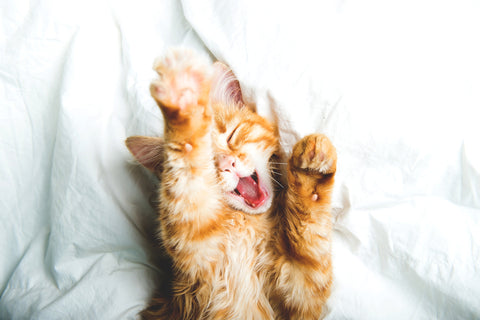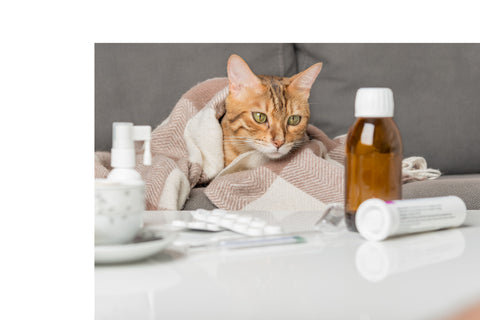
For both mankind and felines lice have proven to be a cause for discomfort and concern. Cat lice continue to plague cats all over the world, although it has become more rare in our day and age.
Cats, who are naturally not able to get rid of the infestation on their own, rely heavily on their owners to solve the problem. What do lice look like on a cat? How do you know if your cat has lice? What lice treatments are available to cats that are safe and reliable? All of these questions will be answered in the following article.
Introduction
Feral or homeless cats are the most likely to have a lice infestation. A lice-infested cat can be treated but if it’s not seen to, it has a knock-on effect on other cats of the same species that are exposed to the lice. Fortunately, handling a lice-infested cat poses no threat to humans because the kind of lice found on cats is species-specific.
In some cases, cats cause more damage to themselves through excessive licking and chewing, which in turn could cause hair loss, skin irritation, and diseases as well as parasitic worms. Another concern when it comes to lice infestation in cats has to do with the effect it has on young kittens.
Types and Causes of Cat Lice
There are several thousand species of lice but just one is associated with cats. Cat lice are known as Felicola subrostrata (or chewing lice). They are described as small, wingless insects with flat bodies that appear to be white to tan in color. These lice lay their eggs on cats’ fur by attaching them to hair strands using glue that they produce. Lice nits or eggs look like white spots which makes it quite easy to confuse them with dandruff.

Cat lice are transferable only from cat to cat and pose no threat to any other species of animal that’s exposed to the lice. It’s very rare for a domesticated cat to get lice without being exposed to an infested cat. Direct contact is the most obvious way of transferring lice from one cat to another. A cat can also be exposed to lice through shared bedding and grooming utensils like brushes.
How would you be able to tell if your cat has lice? Lice will bite and chew on their host's skin which makes life incredibly uncomfortable for a cat. One of the first things you might notice is your cat’s restlessness. They will chew on, scratch and rub the affected areas, doing so relentlessly, to the point of causing hair loss and matting of their fur. Cat lice have been noted more frequently in older cats who are unable to groom themselves.
Before any conclusions can be made, it would be wise to check your cat's fur for evidence of lice and their offspring. The symptoms of having cat lice are incredibly similar to that of flea and tick infestations, so it’s necessary to make a thorough examination of what is causing your cat's behavior to change.
Differentiating between fleas and lice
Fleas and lice can be differentiated by behavior as well as by how they look. Although they are both small insects, lice are flat and wide whereas fleas are tall and their body narrow. Fleas are often associated with jumping and quick movement, unlike lice which are known as flightless, slow-moving insects.
Symptoms of Cat Lice
When cat lice are visible it’s easy to identify them. But before you even get to that stage where you start looking for evidence of the little critters, there are some symptoms you can look out for:
- Excessive chewing and licking (loss of fur as a result)
- Constant biting
- Restlessness
- Sudden allergic reaction (due to the lice bites)
- A mangled and dry coat
Effective treatments to combat lice infestation in cats
Maintaining your cat's health is one of the most important things when it comes to treating a lice infestation. There are two ways to handle the situation. Getting rid of the lice naturally is one option except it doesn’t always work. On the other hand, insecticides do the job quite well, but there are some things you need to keep in mind before you go out and buy a “no lice” product.
Fighting lice with insecticides
Insecticides contain specific chemicals used to kill insects (such as lice, fleas, ticks, etc.) They’re a surefire way of killing those little bugs but will not get rid of lice all at once. It may require quite a few attempts depending on how bad your cat's lice infestation is.
Lice infestations are often treated with flea control products, so one need not fear that a product made to fight fleas will not work as well as one specifically designed to kill lice. Products that contain Fipronil and selamectin are known to put up a good fight against lice. It is important to check with your veterinarian before you administer any kind of chemical formula to your cat. Below are some products that contain Fipronil and selamectin:
Fighting lice naturally
There are several treatments you can use that do not involve chemicals but it will not put a stop to the life cycle or reproduction of lice. Such treatments include washing your cat with dish soap or olive oil. These treatments can remove fully grown lice but not the nymphs (lice eggs).
What you can do at home
There are things you can do at home that will put a stop to reinfestation such as washing your cat's bedding, collar, and grooming utensils. Removing lice nits with a wide-toothed comb will not remove the infestation completely but rather slow it down. It is also helpful to wash your own clothing after handling a lice-infested cat. It would be good to isolate a treated cat in a disinfected cage or living space where it won’t have the threat of being reinfected.
If a cat is severely infested, clipping of the hair may be necessary. This is especially the case if you’re dealing with a long-haired cat.
Preventing your cat from getting lice
What can you do to prevent your beloved cat from getting lice in the first place? Monthly treatments to control lice and fleas will help to prevent a lice infestation. Products containing fipronil, imidacloprid, flumethrin/imidacloprid, isoxazoline or selamectin will control or prevent insects like lice, fleas and ticks from booking a stay in your cat's fur. There is a need to be extra cautious when using any product containing isoxazoline.
Kittens and Lice
Effect of lice on kittens
Lice is commonly associated with kittens. While the same symptoms are shared by an adult feline and kitten, fairly young cats face one danger that adult cats are less likely to face - anemia. Lice causes blood loss which can result in anemia. A lice-infested kitten will show signs of weakness if they have anemia. Another indicator is a pale-whitish gum color.
Treating lice for kittens
Treating a kitten for lice is much like treating an adult cat. Medications like Frontline and Revolution are effective. Alexander Ellis, DVM, suggests that when using these products, “treatment should be repeated every 2 weeks for at least 4 treatments”. Some concern is raised though, as to whether these treatments would be safe for all ages and talking to a veterinarian before administering any chemical treatment is advised.
Bathing the kitten in a lime-sulfur dip is also suggested and can be used on kittens of all ages. It helps to kill adult lice but has no effect on the eggs. It would be beneficial to use a comb and hot soapy water or alcohol, to remove the eggs from a kitten's fur and kill them.
Conclusion
Lice infestations in cats are controllable and pose no major threat to a cat if it is dealt with as soon as possible. Harmless lice treatments are readily available but need to be verified by a veterinarian. With good care and in good time, a lice infested cat or kitten will be well on their way to living a normal, happy, lice-free life.
Frequently Asked Questions
Cats lice (Felicola subrostratus) is species specific so it will not transfer itself onto human skin.
Signs that a cat has lice include constant chewing, licking and an overall restlessness. Checking the fur for lice will confirm that your cat has lice.
It is possible but unlikely. Lice is commonly found on stray or feral cats that have been exposed to harsh or poor conditions.
Home remedies play a part in controlling lice but chemical treatments are the most effective. Lice treatment medications are freely available.



